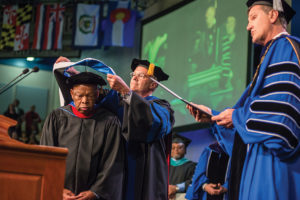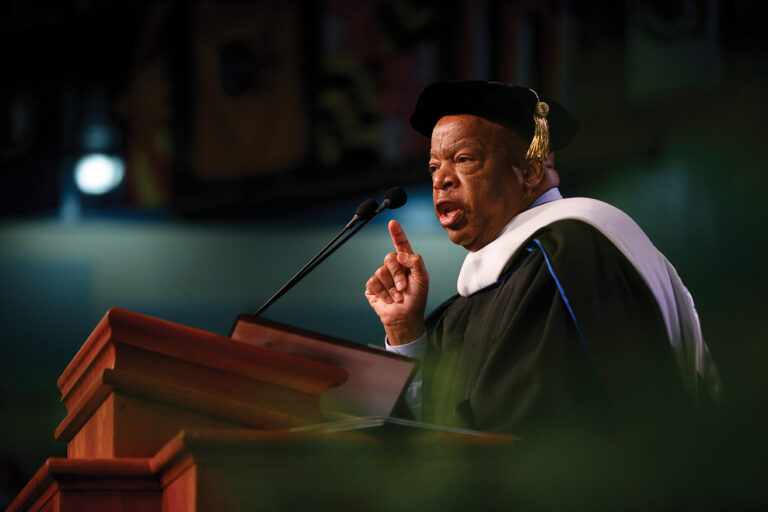Civil rights icon and U.S. Representative John Lewis (D-GA 5th District) delivered the commencement address to the Berea College class of 2017. Drawing on his experience as a student civil rights leader during the 1960s, Congressman Lewis urged the new graduates to continue the fight for justice.
“You must act,” he said. “You must be insistent and persistent to win victories for true democracy in America.”
They could do this by voting, running for office, and petitioning the government. Congressman Lewis reminded the audience of the moral obligations given to them by Berea’s founders, who built a community in opposition to the oppression of an earlier age. As they move forward into the world, students would also have to reject the “official story” and search for truth. “Let the spirit of peace and the preservation of human dignity be your guide.”
At the ceremony, Lewis was moved by the musical presentation, which he said reminded him of the importance of songs to the Civil Rights movement. “The Civil Rights movement without singing would have been like a bird without wings,” he said.
Congressman Lewis on Education, Marching and the House We Share
While he was visiting campus, Lewis sat down with Tim Jordan, Berea College Media Relations Manager, for an interview. What follows is an excerpt of their conversation.

I had an uncle who, when I got ready to go off to college, gave me a $100 bill and a footlocker. I put everything that I owned in that footlocker and took a Greyhound bus to Nashville. I was studying at American Baptist Seminary. I studied religion, philosophy. And I dreamed. I worked in a kitchen for two years, washing pots and pans. Then, the second two years, I worked as a janitor in an administration building, but it taught me that if you want something, you have to be consistent and persistent. Dream dreams, and try to make your dreams become real.
When you see something that is not right, not fair, not just, you have a moral obligation to say something, to do something. When I was growing up, I would ask my mother, my father, my grandparents, why this, why that. They would say, “Boy, that’s the way it is. Don’t get in the way. Don’t get in trouble.” But I heard of Rosa Parks. I heard of Martin Luther King, Jr. And these individuals inspired me to get in the way. In Nashville, black and white students came together, and every Tuesday night, we would study the teachings of Gandhi. We studied the role of civil disobedience. We studied what Dr. King was all about in Montgomery. And before we would go on those sit-ins, we had what we called role playing or social drama, and by the time we started sitting in, we were ready. So, I would say to young people today, study the Civil Rights movement, study the way of peace. Study the philosophy and the discipline of nonviolence. They, too, can help bring about change, not just in America, but around the world.
The world is waiting for you. You received a great education, you are prepared to go out there and lead. I believe that young people today will lead us to a better place, will help not just make America better, but will help make our world better. I would love to see more young people get out there and just push and pull to redeem the soul of America and create a beloved community.
Faith has played a major role in my life. If it hadn’t been for my faith, I don’t know what would have happened to me. My faith has taught me patience, to be determined, to be bold, and just keep looking out for everybody. It’s my belief that we all are the children of the Almighty. There’s a spark of the divine in each and every one of us. And we don’t have a right to abuse it. We must respect the dignity and the worth of every human being.
I can never ever forget March 7, 1965. We only wanted to walk from Selma to Montgomery, Alabama, in an orderly, peaceful, nonviolent fashion to dramatize the need for a voting rights act. Millions of people could not register simply because of the color of their skin. But we were attacked and left bloodied. I thought I saw death. I thought I was going to die on that bridge. I thought it was the last non-violent protest. I believe God Almighty kept me here for a purpose, to continue to bear witness to the truth.
It is moving. Just being on the campus, I can feel this sort of sweet and warm spirit. The sense of community, this fellowship. I think that’s what education is all about, to create community. To realize that we’re one people, we’re one family, we’re one house. We all live in the same house, not just an American house, but the world house. And it doesn’t matter whether you’re black or white, Latino or Asian American or Native American, we’re one people. And as Dr. King said, we must learn to live together, if not as brothers and sisters, we’ll perish as fools.



[…] READ AN EXCERPT of Lewis’ interview with Berea College Media Relations Manager Tim Jordan, published in the Summer 2017 edition of the Berea College Magazine. […]